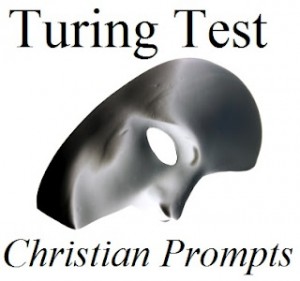This is the second entry in the Christian round of the 2012 Ideological Turing Test for Religion. In this round, the honest answers of Christians are mixed in with atheists’ best efforts to talk like Christians. It’s your job to see if you can spot the difference. The voting link appears at the end of the entry, and you can look at all entries in this round here.
When (if ever) have you deferred to your philosophical or theological system over your intuitions?
I’ve always found that the Moral Law given to us by God through Scripture has been largely intuitive. Most of the wisdom found in Scripture has lined up perfectly with my intuitions. However, one issue I have struggled with in my faith is the Biblical and religious stance on homosexuality. This issue has been a hot-button topic on this blog (especially recently), and I’ve been following along anxiously. It’s hard to be torn between your intuitions and a conclusion that you think to be justified but still find unsatisfying.
I understand the arguments from my faith’s perspective, and I accept that they are valid and sound in concordance with a consistent theology. But each time I discuss this issue, I have to shake my intuitions that homosexuality is not morally problematic. It’s possible that my own feelings about this issue have been betrayed by growing up in a rather fundamentalist area, and have seen a more vile hatred for gays rather than a loving discontentment with their lifestyle choice. It’s very difficult to shake your intuitions, and that’s one reason I generally shy away from entering the fray on this issue.
Are there people whose opinions on morality you trust more than your own? How do you recognize them? How is trusting them different than trusting someone’s opinion on physics?
I generally trust religious leaders and those trained in Scripture to have valuable opinions regarding morality, often (although not always) more valuable than my own.
I’m not convinced that how I discern who to trust with regard to physics is much different than how I discern who to trust in moral matters. We trust someone’s opinion on physics insofar as they have relevant expertise, including but not limited to background knowledge and education, proper methodology, and research relevant to their field. Since I see the Bible as a source of divine revelation, those who have expertise pertaining to the Bible can be expected to have a more informed opinion. More specifically, those who have studied the Bible, relevant history and archaeology, theology, and philosophy will arguably have a better vantage point to make moral decisions.
We can vet the physicist’s opinion through empirical testing. We can see how it holds against the backdrop of prior theoretical physics, and how it compares to the opinions of other experts. Likewise, we can see how the religious leader’s opinion stacks up against a coherent Scriptural exegesis, how it manifests in a cohesive theology, and whether or not is buoyed by sound philosophical foundations.
Can you name any works of art (interpreted pretty broadly: books, music, plays, poetry, mathematical proofs, etc) which really capture the way you see life/fill you with a sense of awe and wonder? You can give a short explanation or just list a few pieces.
Many works of art have had a profound and lasting impact on my life, so it’s difficult to single out just one. While I cherish much of what C.S. Lewis has written, what comes to mind here is the “Space Trilogy.” The trilogy covers the adventures of Dr. Elwin Ransom (who was modeled after Tolkien) and the universal battle between good and evil over the course of three novels. It’s heavily allegorical and Lewis at his finest. There’s one passage in the book titled Perelandra that encapsulates my view of our position in the universe so adequately I’ll reproduce it in full here:
“The whole distinction between things accidental and things designed, like the distinction between fact and myth, was purely terrestrial. The pattern is so large that within the little frame of earthly experience there appear pieces of it between which we can see no connection, and other pieces between which we can. Hence we rightly, for our sue, distinguish the accidental from the essential. But step outside that frame and the distinction drops down into the void, fluttering useless wings.”
This passage serves as a powerful reminder of how limited a scope human beings actually have. Our minute sufferings, our trivial worries and ever-limited understanding wither away when we think of the Almighty.
Click here to judge this entry, and, once you’ve voted, feel free to speculate and trade theories in the comments or look at other entries in this round.











